- Home
- Jason McIntyre
Shed Page 4
Shed Read online
Page 4
Mama would tuck him in each night and have him promise her that he wouldn’t get scared and upset Everett. After she went upstairs and turned on the light for him, Simon would pull all the sheets off his bed and strip down to his underwear to lower his body temperature as much as he could. He’d lay as still as he could on the mattress with his arms and legs spread way out from the rest of his body. As soon as he learned this little trick it was almost like those little critters couldn’t even ‘see’ his body as they made their way into the room. It was almost as if he became invisible to whatever sense they used if he was cold and completely still. They just crawled right over him, pausing briefly at his forcibly calm heart beat—since it was the warmest area on his whole body.
As time went on, Simon suspected that he and the creatures developed some kind of relationship between them. They seemed to scour his room looking to be fed, finding a meal in his bed sheets and on his carpet; tiny hairs and bits of dead skin he suspected. After Simon found out all about the wonders of human skin in Mr. Norman’s biology class, he was sure of his reasoning behind the creatures’ return time after time. Mr. Norman shared an interesting fact in class one day, one that most people don’t know: a great deal of the air we breath in domestic settings, places like schools and houses is, in fact, dead skin cells. Our bodies just discard them into the floating void of air around us. Insects, like moths and mosquitoes, can trace the paths of our dead cells through the air to find us. Sweaty warm bodies, too, are ways that insects can find a living source of food.
Sure enough, the roiling, oily-skinned black creatures scaled up and down the walls, devouring these little particles. They passed across Simon’s naked chest and legs to pick up any bits of flesh and sweat they could find there.
Simon received little slashes and cuts from the creatures when they moved in too close or when he perhaps twitched as they scurried across his tight stomach in the middle of the night. But these little slashes from their claws and mandibles healed extremely quickly. He told me that even the bruises and cuts from Everett’s outrages healed more quickly than they should. Perhaps, even, the creatures excreted some kind of a chemical which helped him heal fast and continue to provide for them.
These were some pretty elaborate things Simon was telling me—two separate living creatures benefiting each other like that—I certainly didn’t understand all of it that day. But once we were within the confines of Daddy’s old shed, Simon immediately felt comfortable to let all of his ponderings spill forth. And they came like a geyser. He had apparently been giving this a lot of thought.
5.
The creatures didn’t come in the winter, the late fall or the early spring. Strictly hot, dry weather prompted the little black visitors. Simon told me that autumn finally coming was a welcome reprieve from staying up half the night waiting for them in the dark. I can imagine he spent many hours down there alone, his eyes peering into the darkness as mine had the night before, never knowing if they’d come, when they’d come, and always that ever-present thought in his mind: I hope the sump pump motor doesn’t run. Just not tonight. If I can only get through one more night without it running...
But that threat was always there for him. Sure, the swarm didn’t return every night. Only on nights when the conditions were right—when the corridor was clear of water, or when the motor had just cleared it out and when it was hot and muggy. He must have developed a real sense of when to expect them over those two years. I suppose he just adapted, as people do. He accepted what had to be endured and after that first week, two years ago, we never heard him complain about his basement room again.
The experimentation continued through the second summer when they appeared again on the first hot night. He discovered that not only were the creatures wary of water but they would not go anywhere near light. Simon lay there as they traipsed across his cold and naked body munching on his leg hairs and loose skin at a lightning-quick rate. He opened one eye just out of simple curiosity, I guess, and witnessed a wide gap in the path of the moving wave of creatures where the ball of light from his flashlight lay across the wall. They steered clear of that shaft of light, never touching it, never even coming close. I can only imagine what Simon’s meticulous mind made of that.
Immediately Simon began wiring his room for a light bulb and switch. He knew that Everett would take him out in the yard and beat him with his belt if Simon undermined his abilities and wired in that light fixture and switch by himself, so Simon constructed a hidden fixture beneath the wallboard. It was the only way. He ran the wire Daddy had placed years before back up through the rafters of the basement into the light switch at the top of the stairs and connected it to a new switch in his own room next to the bulb. The current ran from the circuit box in the kitchen to the switch at the stairs down to Simon’s new bulb and switch. And he did it all himself, when Everett was at work and Mama was out in the garden.
Daddy was a good electrician, and apparently, a good teacher too. Simon had remembered everything he’d ever told him about electrical current and Simon put the knowledge to good use. He gathered money from every source he could, selling his baseball cards, the records Mama and Daddy had bought each of us, and purchased the necessary fixtures and bulbs from Mr. Parson at the hardware store. Each night, Simon would pull off the section of wallboard that Everett had pounded up the year before. He’d screw in the light bulb and turn on the switch after everyone had gone to bed. It was an ingenious plan for a twelve year old. Granted, it was only a sixty watt bulb, quite dim in that entire space, but it was enough to keep those critters away. For more than a week they didn’t venture past the corridor. Simon pushed his closet drape aside and held his flashlight pointed down into the well and saw them waiting there, the high-pitched squeal emanating from their collective throats. It was a big triumph for him but it wouldn’t last.
He supposed that they adapted to the light in some way. Soon, they ventured into the room, in greater numbers than ever before and scratched Simon up pretty good. He was scared of what would happen to him when they exceeded what his little body could provide. They were, after all, numbering in the hundreds at this point.
But what else could Simon do? He couldn’t leave the basement. The door was locked each night. His new father would hurt his sissy step-son if he wailed and carried on. It would become yet another situation, and Simon couldn’t even think about what that would mean. He couldn’t stop the creatures from coming by blocking their pathway nor could he prevent them by flooding them out or shining that sixty watt bulb on them. He was on the verge of giving up for the first time when it occurred to him that he could buy some more time by getting a stronger bulb. That worked—for a while. Soon, they adapted to that one too. He added a second hundred-watt bulb and a third, running off the same circuit. Each time they adapted. The last night that they came during the unseasonably warm autumn of the year before, the three bulbs in Simon’s new defence apparatus plus the other one over the work bench were apparently too much for the breaker in the upstairs breaker box to handle. At about four in the morning, the whole thing blew. It made this huge popping sound and the lights all went off in Simon’s room. He knew that Everett would be bounding out of bed any second.
Startled himself, He unscrewed the bulbs as quickly as he could and banged the piece of wallboard up as best he could in the dark with only that dim flashlight to help him see. As he did so, he could hear Everett stamping towards the kitchen from the bedroom above. Upstairs, he stomped across those squeaky floorboards, all the way from the bedroom to the box where the loud pop of the breaker had come from. Simon could trace his path above and could even hear the rising anger in his quickening paces.
When Everett discovered the blown breaker and the smoke coming from the blackened light switch at the top of the stairs he came to the obvious conclusion—that Mama had been leaving the light on for his scared little son downstairs all this time and it had finally blown. His yelling was so loud I was sure that the neighbors ac
ross the creek had heard him. “You,” he blared at Mama when she came into the kitchen, “You think I don’t know what you’ve been doing?” He hollered. It was dark but I could see the whites of his eyes bright in the dimness. “That pantywaist boy o’ yers has you wrapped around his little finger doesn’t he? You couldn’t just do what I tell ya. You just had to keep the light on, didn’ ya?” Everett suddenly made a mocking voice, mimicking the way Simon must have whined to Mama about leaving the light on, “Mommy, please leave the light on. I’m scared!”
Everett had intended to march down to the basement and haul him up to the kitchen by his ear. But when he unlocked and opened the door, Simon was waiting for him at the top of the stairs. Everett’s surprise at this was only momentary. He grabbed my brother and pulled him into the kitchen.
He hit both of them that night, blackened Mama’s eyes as well as Simon’s, as they tried to sputter apologies through split lips and mouths full of blood. He was livid and all I could do was watch, peering out from behind the kitchen counter. Other than the night the swarm crawled across my tummy in the dark and I wet myself on Simon’s sheet, it was the most scared I’d ever been. I thought he was going to kill them both and there was nothing I could do to stop it.
Tired, I guess from his yelling and his swinging, Everett took his bloody knuckles and stained shirt back to bed with him. The two of them, my mama and my brother, lay there on the floor of the kitchen, in the dim early morning gloom, not a word from either of them. Simon’s head quivered a little; small drops of blood fell to the linoleum from his face. I remembered the year before when things got this bad and I remembered Mama pouring ice on Simon’s swollen parts as he lay unmoving in the bathtub. And, this time it was me who brought ice from the freezer. I went to the sink as Mama had done then for her oldest boy, and brought them moistened dishcloths. Just my presence, I think, awakened Mama out of her silent trance and she took over then. She was in terrible pain but her first instinct was to make sure Simon was okay. She was in shock but she led all of us down to the basement that night. It had cooled off somewhat by after four and she wrapped us all in Simon’s blankets, placing ice-filled hankies over his brow and cheeks and one over her own. We slept together that night, all huddled as one. Simon was delirious as he drifted off. He kept saying, “I shouldn’t have left it on all night. I should have turned off the light...”
6.
In time they both healed, Simon faster than Mama, but Simon made no effort to ward off the creatures each night. He never took the wallboard out, nor did he screw in the bulbs. As we sat on the table in Daddy’s work house he told me that he just didn’t care anymore at that point. He had lost all hope that he’d ever be able get away from this place—this place where Everett could hit him just for sneezing, this place where the oily black hive of creatures would eventually kill him in the night. But, for some unknown reason the cool weather held. We had a wet autumn that year and the swarm didn’t come back, not once.
I took homework to Simon and told his teacher, as Mama had instructed me, that Simon had a bad case of the mumps. Everett had the circuit breaker and light switch fixed by a man from the mainland and bitched at Mama about the sixty dollars it cost him. She didn’t reply to that nor to anything else he said. She didn’t make him any meals and didn’t sleep in the same bed as him for more than two weeks. Instead, she slept in Simon’s room with him. Scared of sleeping alone up there with Everett, I stayed down there with them too. But Everett did his best to make amends. He made breakfast for us one Saturday and seemed to be in the best mood we’d seen in quite some time. He brought freshly picked flowers to Mama as she ate his runny eggs and dry toast and sipped the juice he poured through a straw. Despite her barely healed lip and the rest of the remnants of that night in the kitchen, what he’d done to her, in those days I suppose she couldn’t really help but forgive him. After all, what else could she do?
7.
Simon and I spent most of that day, almost a year after Everett’s rant in the kitchen, away from the heat, under the cover of Daddy’s old shed. He told me all of these things, things he knew about the creatures from under the ground and the things that he only suspected he knew. He seemed to leave things on a dire note. I wanted to ask him all kinds of questions. What would happen when their numbers eventually climbed so high that he couldn’t fend them off, or hide from them by laying there in nothing but his undershorts? They were, after all, already showing signs that they could adapt and thrive. What happens when one little boy’s body wasn’t enough to satiate them? What happens when they come up those stairs?
Simply put, though, I was too young to verbalize these thoughts or even to articulate them in such a way. But they were real concerns. I think I understood my questions and could feel them—if only on an instinctual level. And I think Simon did too. His silence was his answer: He didn’t know.
But he told me that I shouldn’t worry. Just as he had said to me on numerous occasions before this: After the funeral; after we’d seen Mama crying in her bedroom, her tears falling on her open chequebook; the night after Everett beat the living pulp out of him. It was like a safety mechanism for Simon. Whatever there was to worry about he’d carry the burden for both of us.
And so that summer carried on, for the most part just as the last few had. We played in the sun, making up tales of heroes and villains with the other kids on the island. We played games of pick-up ball and pretended we were Jackson and Munson, a dream team if ever they would both play for the Yanks. We ate our dinner with Mama and Everett and raced back out into the evening, thoughts of pirates and cowboys battling it out, on our minds and in our hearts. We played in the creek near the house, in the woods out past that, and out in Predis field. Doing what I think most boys that age did, we tried to be kids. Although Simon was indisputably not a kid anymore. I think he ceased to be one that first week of terror he’d been subjected to. If not because of that throng of black creatures then in spite of them. That and because of the back of Everett’s hand.
Most likely it had been all of those things.
He held his secret and for once, I finally shared it and held onto it just the same. But he held tighter than I, as he always did. It was more pressing on his heart than on mine because he was the one who had to endure it. The creatures were ever-increasing in numbers and they were no longer afraid of his ever-increasing battalion of light bulbs. It was becoming a losing fight for him then. I could see it and I knew that something was going to break. I just hoped that it wouldn’t be him. Strange days were coming.
Part III
A Certain Slant of Light
1.
One night in late July, the calm was disturbed. Ever since I had been made aware of those wall-climbing critters I had thought it an odd bit of irony that Simon was in this position. He’d lay awake at night, undoubtedly hoping for thunderstorms and rain so that he could have a reprieve from his nightly visitors. On the other hand, all those storms made choppy waters off the coast—choppy enough to increase the number of boats and lobster potters needing hull repairs and the like. It was not uncommon for the many fishing boats to find themselves rammed against the rocks that dotted the shallow waters around the island coming and going to sea. Storms meant cooler weather, no swarms of black critters in the forecast, but they also meant that Everett had some long hours at Ethan’s patching the hulls of those boats. And that meant he’d be cranky.
Just less than two full weeks of steady rain and scattered storms, extremely unusual for the island in July, kept Everett at work much of that time. Simon and I helped Mama in the garden on those rare moments of sun between the clouds and the rainy days. We also spent a great deal of time indoors with her, playing games and telling stories. I think she really enjoyed that her sons were getting a little older now. She didn’t have to pull as many punches and she didn’t have to shield us from as many things she wanted to say. She could talk to us more like she needed to, and not as the little boys of before. One night near th
e end of the rainy weather, when Everett was working a late shift at the shop, she told us that it felt more in that week like it had when Daddy had been with her than in all the time since he’d been gone.
As we sat that evening in the dim orange glow of sunset falling across our faces and across the walls through the living room window, Mama removed a small object from the front pouch of her apron. It was one of Daddy’s old jack-knives. He’d had several of them, I had fuzzy memories of him scraping the bark off saplings behind the house with one years back. The young, wet bark of those little trees made the fire burn bright and smell sweet. We used to spend most hot evenings out there in the summer, roasting marshmallows and hotdogs, Daddy telling us stories about his own childhood over the fire pit. For more than two years those times had felt like so long ago. But, right then, when Mama pulled out that polished, wood handled knife, I was suddenly thrust back into those old moments. Suddenly no time had passed since Daddy’s funeral, since the endless nights by the campfire with him and Mama.
“Here,” she said, giving the jack knife to Simon, “Your daddy wanted you to have this when you were old enough. It was very special to him...his daddy had it engraved for him.” He took it and rubbed his fingers over the shiny bronze plate with Daddy’s initials, S.T.K.
She looked at me then, her eyes wide and as loving as I’d ever seen them. “I don’t want you to feel left out, Rupie. In a few years when you’re big enough, you’ll get one of Daddy’s knives too. He loved you both so much.” She hugged us both, leaning forward and giving us as much affection as we’d probably received since she’d married Everett.

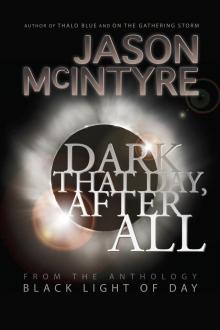 Dark That Day, After All
Dark That Day, After All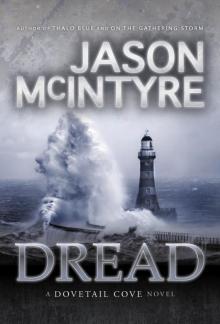 Dread
Dread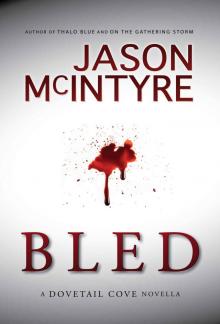 Bled
Bled Instead
Instead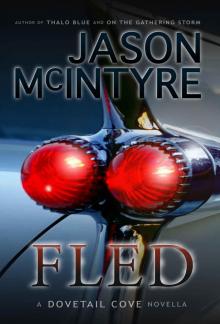 Fled
Fled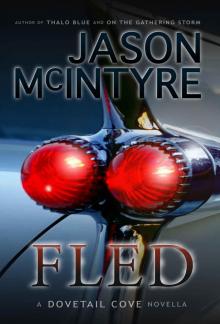 Fled (Dovetail Cove, 1973) (Dovetail Cove Series)
Fled (Dovetail Cove, 1973) (Dovetail Cove Series) Zed
Zed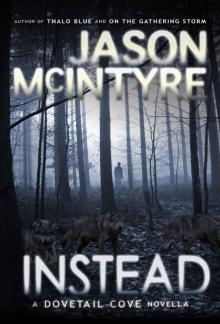 Instead (Dovetail Cove, 1979) (Dovetail Cove Series)
Instead (Dovetail Cove, 1979) (Dovetail Cove Series)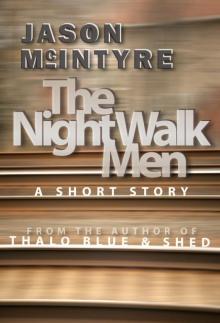 The Night Walk Men
The Night Walk Men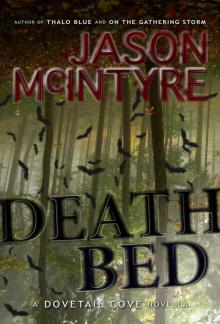 Deathbed (Dovetail Cove, 1971) (Dovetail Cove Series)
Deathbed (Dovetail Cove, 1971) (Dovetail Cove Series)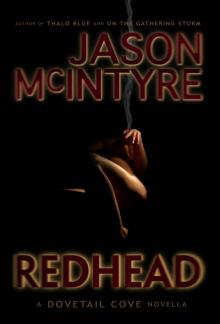 Redhead (Dovetail Cove, 1974) (Dovetail Cove Series)
Redhead (Dovetail Cove, 1974) (Dovetail Cove Series)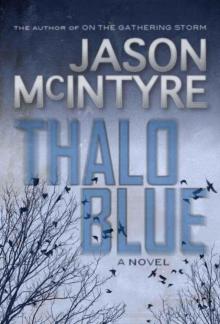 Thalo Blue
Thalo Blue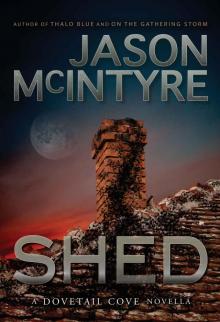 Shed
Shed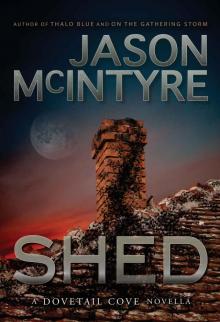 Shed (Dovetail Cove, 1977) (Dovetail Cove Series)
Shed (Dovetail Cove, 1977) (Dovetail Cove Series)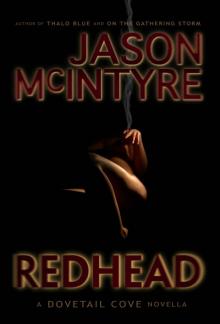 Redhead
Redhead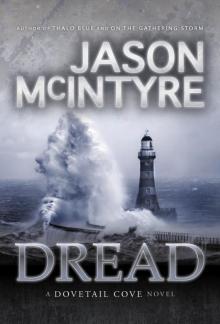 Dread (Dovetail Cove, 1978) (Dovetail Cove Series)
Dread (Dovetail Cove, 1978) (Dovetail Cove Series) Zed (Dovetail Cove, 1975) (Dovetail Cove Series)
Zed (Dovetail Cove, 1975) (Dovetail Cove Series)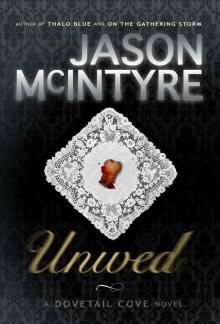 Unwed (Dovetail Cove, 1976) (Dovetail Cove Series)
Unwed (Dovetail Cove, 1976) (Dovetail Cove Series)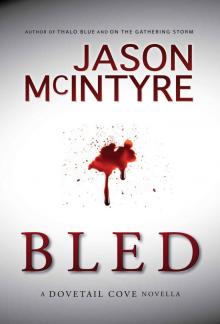 Bled (Dovetail Cove, 1972) (Dovetail Cove Series)
Bled (Dovetail Cove, 1972) (Dovetail Cove Series)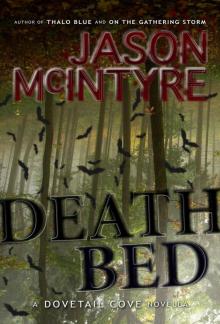 Deathbed
Deathbed